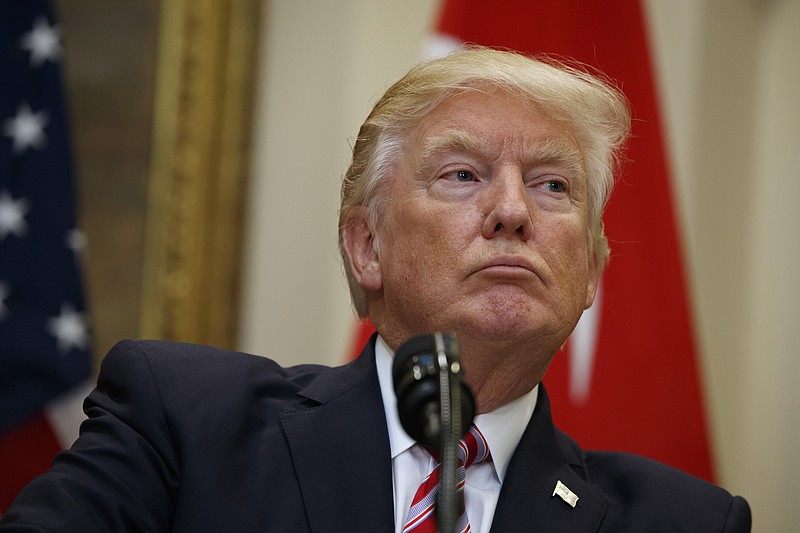At what point does the Trump/Russia scandal become too much, too hot, too toxic for the GOP?
And what is Paul Ryan smoking that has him saying he hopes to put a tax reform plan on President Trump's desk by Christmas?
One possible answer is denial. A more likely answer is desperation.
Republicans are playing a disgusting and dangerous game of bait and switch. They don't like the sound of all the smoke alarms going off, so they try to smother the glow beneath the smoke and yell, "hey, look over here "
Last week, The Washington Post asked about a dozen Republicans in Congress a simple question: "Do you trust President Trump's judgment on major decisions?"
Most, like our own Tennessee Sen. Bob Corker, "diverted and demurred," as the Post story termed it.
"I thought the president gave a great speech in Saudi Arabia," said Corker, chairman of the Senate Foreign Relations Committee. "Those kind of questions are not - "
The Post wrote that Corker went "silent for five seconds before concluding that he was facing a 'gotcha' question."
Meanwhile, Trump continues to bumble through his first year as president. In his first four months, he has spilled intelligence secrets to Russian officials and a Philippine president. He has jetted around the world looking peeved at the tremendous effort required to look even slightly presidential. By the end of April, he'd spent 19 days golfing, surpassing all three of his recent predecessors combined. He still refuses to disclose his tax returns, and now is hedging a post-election pledge to track and donate profits from foreign government officials and emissaries staying at Trump properties (Pocketing those profits would be a violation of the Constitution's emoluments clause, which essentially prohibits federal government officials from accepting gifts from foreign governments.)
All the while, the Russia scandal smoke has been building to a four-alarm fire.
Russia attacked our election and helped put in office its favored candidate through hacking and fake news. The president's claim that no one from his team was in contact with Russia has been roundly discredited. Trump fired FBI director James Comey, and despite initial messaging that he did so because Comey made mistakes in the Clinton email probe, Trump then braggingly acknowledged on national television that it was because of his dissatisfaction with the FBI's Russia investigation.
We're now learning that before the firing, the president urged the FBI director to go easy on Michael Flynn, his former national security adviser of less than a month. Flynn, who was forced to resign for lying to the vice president about the nature of his contacts with Russia, has pleaded the Fifth, saying he cannot testify before a congressional investigatory committee without incriminating himself.
We're also learning that Trump in late March asked two of the country's top intelligence officials - Dan Coats, the director of national intelligence, and Adm. Michael S. Rogers, the chief of the National Security Agency - to make public statements saying there was no evidence of collusion, hoping to undercut the FBI's Trump/Russia probe. Both men rebuffed the request, which they saw as an inappropriate effort to inject politics into an intelligence and law enforcement matter, current and former American officials told The Washington Post.
And last week, former CIA chief John Brennan told members of the House Intelligence Committee: "I encountered and am aware of information and intelligence that revealed contacts and interactions between Russian officials and U.S. persons involved in the Trump campaign that I was concerned about because of known Russian efforts to suborn such individuals." Brennan left office on the day Trump took office with "many unanswered questions" and he added, "I don't know whether such collusion existed."
Intelligence officials, of course, have since acknowledged Russia's election meddling for Trump, and they have linked at least five of Trump's team to Russia in some way.
The Senate Intelligence Committee also has asked for financial records into possible ties between Russia and Trump or his associates from a unit of the U.S. Treasury Department that fights money laundering. The unit, the Financial Crimes Enforcement Network, or FinCEN, had said it will provide those records, according to The Wall Street Journal. Yet nearly two weeks later, senators on the committee were wondering aloud on television if the Treasury Department may be slow-walking the release of those records.
Forget collusion with Russia for a moment. From our perspective, Trump and his administration have followed a remarkable pattern of obstruction of justice, and that alone should give any American cause to doubt this president's judgment.
The bigger question is how long the rest of the GOP - choosing to see only scripted Trump speeches in Saudi Arabia, and all - is willing to play that same obstruction game.
